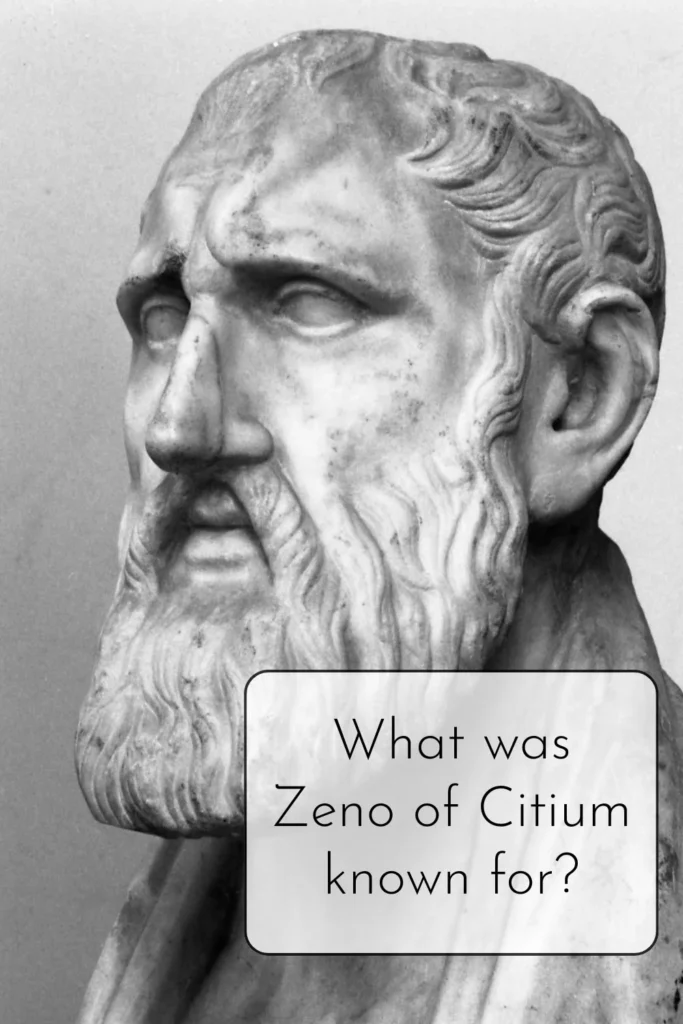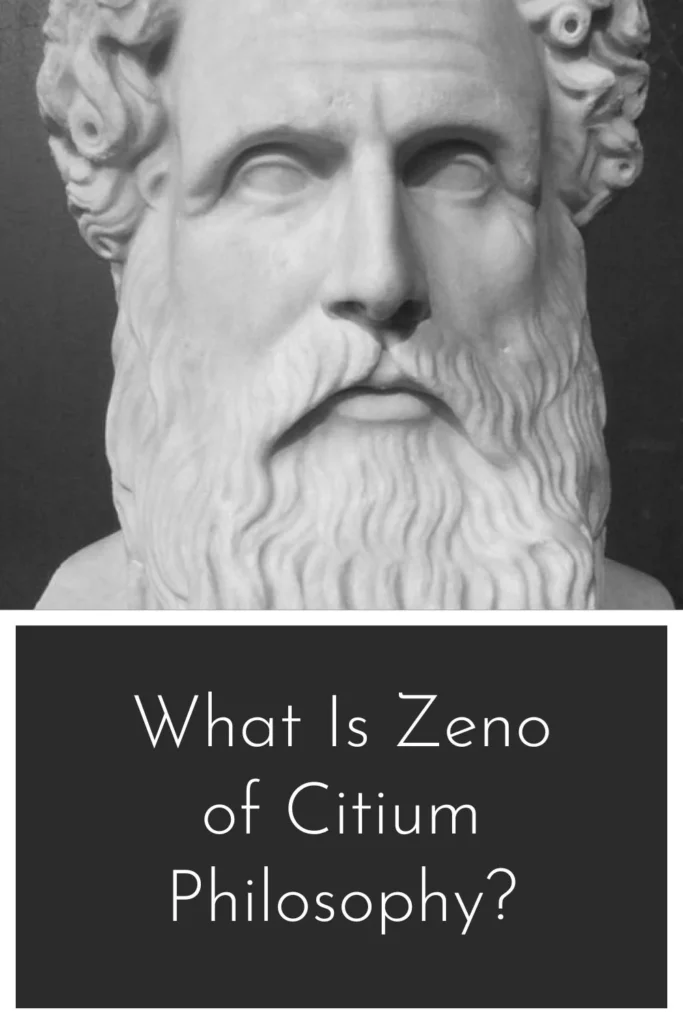Who is Zeno of Citium?
Zeno of Citium was the founder of Stoicism, one of the most influential philosophies in history. He developed a way of thinking that prioritized self-control, reason, and living in harmony with nature. If you’ve ever heard of the Stoic mindset—calm under pressure, grounded in values—it all started with Zeno. In this blog, you’ll uncover powerful insights from the original Stoic of Citium himself—timeless quotes that offer mindset shifts, real-world wisdom, and a clearer path through modern chaos.
Where Was Zeno of Citium Born?
Zeno came from Citium, a port city on the southern coast of Cyprus—modern-day Larnaca. Though not as famous as Athens or Sparta, Citium left its mark on history by producing one of philosophy’s most influential minds.
A bustling Greek-influenced city under Phoenician control, Citium exposed Zeno to a mix of cultures, trade, and ideas. That early exposure to the unpredictable nature of life—especially through seafaring and commerce—likely shaped his obsession with control, resilience, and fate.
And while Athens became the stage for his teachings, Citium was the forge—the place where hardship, exposure, and experience lit the fire that became Stoicism.
So, Stoicism philosophy started in a coastal city on an island, with a man who lost everything – more on that later on… and then built for people who feel the same.

What Was Zeno of Citium Known For?
What was Zeno of Citium known for? More than just founding a school of thought, Zeno reshaped what it means to live with purpose. He built the blueprint for Stoicism—a philosophy rooted in reason, virtue, and inner strength—that’s still changing lives 2,300 years later.
He studied under Cynics, absorbed lessons from earlier philosophers, and eventually started teaching at the Stoa Poikile—a painted porch in Athens, where the name “Stoicism” was born.
Zeno is best known for:
Teaching that virtue is the only true good
Defining the goal of life as living in agreement with nature
Emphasizing logic, emotional discipline, and moral clarity
Inspiring a lineage of Stoics—from Cleanthes to Marcus Aurelius
So the answer to a question What was Zeno of Citium known for – is simple: he was the Stoic before all the Stoics. His influence wasn’t loud, but it was foundational. Without him, there is no Stoicism.
What Is Zeno of Citium Philosophy?
Zeno of Citium philosophy laid the foundation for what we now call Stoicism—a system built not just for thinking, but for living well. At its core, Zeno taught that the purpose of life is to live in agreement with nature. That meant living with reason, accepting what we can’t control, and practicing virtue in everything we do.
Unlike empty theory, Zeno’s Stoicism was meant to be practiced daily. This is where key Stoic principles come in:
Virtue is the only true good. Everything else—money, health, reputation—is secondary.
Live according to reason. That means using logic, not emotion, to guide your actions.
Accept fate. What happens is not up to you. How you respond is.
Practice self-discipline. Master your desires instead of being mastered by them.
Zeno wasn’t about retreating from life—he taught people how to engage with it powerfully and peacefully. His philosophy wasn’t for monks or ivory-tower thinkers. It was built for the real world. And that’s why practicing Stoicism today still works.

Zeno of Citium on Self-Control and Mastery
One of the pillars of Stoic philosophy—and Zeno’s teachings in particular—is the idea that true power lies in mastering yourself. The world is chaotic, unpredictable, and often unfair. But according to Stoicism Zeno of Citium believed that none of that truly matters if you’ve trained your mind to respond with discipline instead of impulse.
Self-control, for Zeno, wasn’t just a virtue—it was freedom. He taught that anger, fear, greed, and desire are the chains we willingly wear when we fail to govern ourselves. But when we choose reason over reaction, silence over outburst, restraint over indulgence—we’re no longer ruled by externals.
As Zeno put it:
Man conquers the world by conquering himself.
And that’s the essence of Stoicism. You don’t control the storm. You control the sail.
Zeno’s focus on internal discipline wasn’t about suppression—it was about clarity. By mastering emotion, you make better choices, build real strength, and move through life with unshakeable calm. In a world that constantly tests your limits, Zeno’s message is clear: the most Stoic thing you can do is master yourself first.
How Zeno Used Logic to Build Practical Stoicism
At the heart of Zeno of Citium philosophy was a sharp, no-nonsense tool: logic. But Zeno didn’t treat logic like some abstract mental game. For him, it was the foundation of practical Stoicism—a system built to help you live better, not just think harder.
He believed that everything—your decisions, your emotions, your values—should pass through the filter of reason. Why? Because reason clears the noise. It stops you from reacting out of fear, pride, or impulse. It’s the muscle that lets you pause, assess, and choose the right action, even when life hits you sideways.As one of the earliest practicing Stoics, Zeno didn’t preach cold intellect—he taught clarity of thought. He broke life down into logic so that anyone could rise above emotion-driven chaos and live with intention.

Happiness is a good flow of life.
And that flow, Zeno believed, came from a mind governed by reason, not random emotion.
His teachings inspired a long line of Stoics—from Cleanthes to Marcus Aurelius—who used reason like a compass. In today’s world of overthinking, overreacting, and overcomplicating everything, Zeno’s logical approach is still a life-saving reset button. Logic isn’t just philosophy—it’s peace.
Why Virtue Was Everything to Zeno
If there’s one idea that defines Stoicism, it’s this: virtue is the only true good. Zeno didn’t measure a good life by wealth, fame, or success. He believed the only thing that matters is how you choose to act—with courage, wisdom, justice, and self-control.
This wasn’t feel-good philosophy. It was brutal clarity. In Zeno’s eyes, a poor man who lives with integrity is better off than a rich man who cheats and lies. Because when everything external gets stripped away, the only thing you own is your character.
Well-being is attained little by little, and nevertheless is no little thing itself.
Virtue wasn’t a vague ideal—it was practical. Zeno taught that living in alignment with Stoic principles meant choosing the right thing, even when it’s hard. Especially when it’s hard.
And this is what made Stoicism revolutionary: it put full responsibility for the good life in your hands. Not fate. Not luck. Not politics. You.
Zeno showed that real freedom doesn’t come from doing whatever you want—it comes from becoming someone worth respecting. Someone virtuous. Someone resilient. And that’s not just Stoicism—it’s power.
Zeno on Simplicity, Nature, and the Good Life
If you stripped life down to its essentials, what would be left? According to philosopher Zeno, that’s exactly how you’re meant to live. In his view, the good life wasn’t found in excess, distraction, or chasing status—it was found in simplicity, alignment with nature, and quiet self-discipline.
Zeno taught that living well means living naturally. That doesn’t mean running into the woods or rejecting civilization—it means understanding your nature as a rational being, and acting in line with it. For Zeno, that’s where peace is found—not in getting more, but in needing less.
The goal of life is living in agreement with nature.
And when you live that way, you’re no longer controlled by desires, fears, or public opinion. You live lightly, clearly, and with intention. That’s the real meaning of Stoicism—not coldness or apathy, but a return to what matters.
In a world built on overstimulation and noise, Zeno’s minimalist mindset is more relevant than ever. It’s a reminder that freedom isn’t out there—it’s within you, waiting behind everything you’ve been told to chase. A Zeno-like life is a simpler life. And that’s what makes it powerful.
What Did Zeno of Citium Teach About Listening and Speech?
When Zeno of Citium taught Stoicism, he didn’t just focus on abstract ethics or inner strength—he also emphasized something people overlook every day: how you communicate. Words, after all, reveal character. And for Zeno, mastering your mouth was just as important as mastering your mind.
He believed most people speak too soon, say too much, and regret it later. That’s why his teachings stressed listening more than speaking, and thinking before reacting.
We have two ears and one mouth, so we should listen more than we say.
Better to trip with the feet than with the tongue.
These weren’t just clever sayings. They were part of a deeper Stoic philosophy: every word should be chosen with care, every silence should be intentional, and every conversation should serve a purpose greater than ego.
So, what did Zeno of Citium teach us here? That speech is a tool, and tools can either build or destroy. The wise Stoic builds. He listens first, speaks last, and never lets his tongue outrun his character.
In today’s world of impulsive replies and endless opinions, Zeno’s advice is a cheat code: talk less, listen better, mean every word.
How Zeno Faced Adversity Like a Stoic
Zeno of Citium didn’t write about hardship from the comfort of theory—he lived it. Before founding Stoicism, he lost everything in a shipwreck. His possessions, his plans, his path—gone. But instead of collapsing under loss, he turned it into a transformation. That moment didn’t break him. It built him.
That’s the essence of practicing Stoicism—not avoiding adversity, but using it as fuel. Zeno didn’t teach people how to escape difficulty. He taught them how to stand inside it with dignity.
Fate is the endless chain of causation, whereby things are.
Stoicism demanded clarity, composure, and courage—especially when life gets ugly. To Zeno, adversity was not a curse. It was a test. And if faced well, a teacher.
This part of his philosophy is brutally relevant today. We chase comfort, avoid discomfort, and call that happiness. Zeno flipped that script. Real growth, he believed, comes through resistance. Through practicing Stoicism in the messy moments, when it’s least convenient and most needed.
If life just hit you? Good. Zeno would say: now’s your chance to rise.
What Did Zeno Believe About Death and Fate?
When it came to life’s biggest unknowns—death and fate—Zeno of Citium didn’t flinch. While most people fear the end, Zeno taught that death is not evil—it’s natural. To him, fearing death made as much sense as fearing the sunset. It’s part of the cycle. It’s part of nature.
No evil is honorable: but death is honorable; therefore death is not evil.
So, what did Zeno of Citium believe about the universe? That everything happens according to a rational order—logos. You’re a part of that whole, not separate from it. Which means that when something happens—good or bad—it happens through nature, not against you.
This is the true meaning of Stoicism: to live with clarity and die without fear. Zeno didn’t promise immortality. He promised peace of mind, even in the face of loss, endings, or uncertainty.
And when his own time came, he didn’t resist it. According to ancient accounts, Zeno ended his life calmly, believing it had run its course in line with fate. No panic. No complaint. Just acceptance.
In a world that avoids even the thought of death, Zeno offers a radical alternative: don’t fear the end—understand your place in the whole. When you grasp that, nothing can disturb you. Not even death.
Zeno of Citium’s Teachings on Inner Strength and Leadership
Leadership, according to Zeno, didn’t come from titles, power, or loud opinions. It came from something much harder to build—inner strength. Zeno believed that the strongest person is the one who has learned to lead themselves first.
A bad feeling is a commotion of the mind repugnant to reason, and against nature.
To Zeno, if you couldn’t rule your own emotions, thoughts, and impulses, you had no business trying to lead others. That’s why the Stoics taught control, discipline, and calm—not to impress people, but to lead by example.
Leadership in Stoicism isn’t about control over others. It’s about control over yourself—your reactions, your pride, your habits. Zeno saw real influence as quiet, steady, and earned through consistent action. You don’t need to speak the loudest. You just need to live with clarity and courage.
This is one of the timeless Stoic principles: power without character is weakness in disguise. Zeno taught that the greatest authority you’ll ever earn is over your own mind. And once you have that, people follow—not because you demand it, but because you embody it.
How Did Zeno of Citium Die?
The story, fittingly, is as Stoic as the man himself.
According to World History Encyclopedia, Zeno was in his old age when he tripped and broke a toe, leaving the school. Instead of calling for help or lamenting his misfortune, he simply quoted a line from a play—“I come of my own accord; why then do you call me?”—and calmly held his breath until he died.
Now, whether every detail is factual or mythologized, the takeaway is clear: Zeno didn’t fear death. He faced it on his own terms.
What happened to Zeno of Citium wasn’t tragic—it was consistent with everything he taught. Accept fate. Act with reason. Don’t cling to what’s beyond your time.
For a man who built a philosophy around letting go of what you can’t control, this ending wasn’t just poetic—it was principled. Zeno didn’t just teach Stoicism. He died by it.
The Legacy of Zeno: What the Founder of Stoicism Left Behind
Does Zeno have any writings? Technically, yes—Zeno of Citium wrote several works, the most famous being The Republic, which was a deliberate response to Plato’s Republic. But none of Zeno’s original writings have survived, except for a handful of fragmentary quotations preserved by later authors.
And yet, his impact? Massive.
Despite the loss of his texts, Zeno’s legacy is carved into the core of Stoic philosophy. He wasn’t just another thinker—he was the man who built a practical framework for living. Through the works of his students like Cleanthes and Chrysippus, and the reflections of later giants like Epictetus, Seneca, and Marcus Aurelius, Zeno’s ideas shaped one of the most durable and transformative philosophies in history.
He taught virtue over vanity, reason over impulse, and self-mastery over blame. And that blueprint still works.
Zeno didn’t write for fame. He wrote to free people from their self-made prisons. And even now, long after his books disappeared, his Stoic clarity still survives—not on pages, but in people.
Timeless Zeno of Citium Quotes That Still Matter Today
Zeno of Citium didn’t leave us books, but he left fragments sharp enough to cut through centuries. Passed down by students, historians, and later Stoics, these quotes are more than words—they’re reminders.
In just a few lines, Zeno captured what most modern books take hundreds of pages to fumble through. He didn’t care about sounding poetic. He cared about training the soul.
Here are a few of his lesser-known, but just as powerful, teachings:
All things are parts of one single system, which is called nature.
Extravagance is its own destroyer.
Nothing is more hostile to a firm grasp on knowledge than self-deception.
Each quote points to a deeper Stoic truth: live in harmony with the whole, master your desires, seek truth, not comfort, and act with self-respect—even when no one’s watching.
This is practicing Stoicism in its rawest form. Zeno didn’t speak to entertain. He spoke to wake people up. And if you absorb these words—not just read them—you’ll start to think, move, and lead like a Stoic, too.
Because Stoicism isn’t about sounding wise.
It’s about living like it.
Hidden Gems: 4 Zeno Quotes That Hit Harder Than You’d Expect
While some of Zeno’s sayings have become well-known among Stoics, others quietly carry deep insights into fate, friendship, time, and reality—the kind of lines you reread and feel in your bones.
A friend is our alter ego.
Zeno wasn’t big on sentimentality, but he knew this: a true friend is more than company—they’re a mirror. Someone who reflects your best self back at you and holds you to your values. Friendship, in Stoic terms, isn’t just emotional comfort. It’s a shared pursuit of virtue.
When a dog is tied to a cart, if it wants to follow, it is pulled and follows, making its spontaneous act coincide with necessity. But if the dog does not follow, it will be compelled in any case. So it is with men too: even if they don't want to, they will be compelled to follow what is destined.
Zeno’s analogy here is brutal—and brilliant. You can resist your fate, drag your heels, and curse the road. But you’re still going. The only choice you really have is how you go. This is Stoic surrender without passivity: follow fate not because you’re weak, but because you’re wise.
If being is many, it must be both like and unlike, and this is impossible, for neither can the like be unlike, nor the unlike like.
This cryptic quote shows Zeno’s roots in logic and paradox. While it leans philosophical, the takeaway is sharp: reality is not built on contradictions. Neither is a well-ordered mind. Clear thinking is Stoic thinking—Zeno knew that confusion leads to chaos, both mentally and morally.
No loss should be more regrettable to us than losing our time, for it's irretrievable.
No fluff here. Just raw truth. Money comes and goes. Time only goes. Zeno’s reminder is simple: every wasted hour is a chapter you’ll never rewrite. If you’re serious about living with purpose, track your time like you’d track stolen gold.
These aren’t just lines from history—they’re warnings, reminders, and wake-up calls. And the more you sit with them, the more they work on you. Quietly. Deeply. Permanently.





